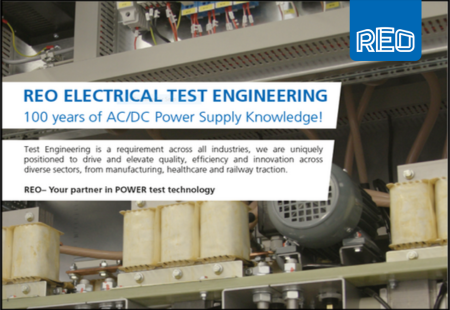Variable Transformers, and what REO do with them!
Downloads
| REO2024-20-Advert.pdf ( PDF 2744KB) |
| Advertt_TestEngineering_UK_V2.pdf ( PDF 3629KB) |
William Stanley Jr., an American electrical engineer, invented the variable transformer in the late 19th century. Stanley later founded the Stanley Electric Manufacturing Company, which eventually became part of General Electric.
Variable transformers, also known as REOVAR or VARIACs, are devices used to vary the output voltage in electrical circuits. They usually consist of a single coil wound around a laminated toroidal core, with a moveable tap that can be adjusted to select the desired output voltage.
Most electrical engineers are familiar with conventional desktop units, which typically provide variable AC voltage at 8 A. However, their usefulness or power capacity is not limited to voltage tolerance testing for Low-Voltage (LV) equipment.
REO, having only started to manufacture in 1925, remains one of the oldest manufacturers of Variable column-type transformers. These transformers are preferred whenever smooth adjustment of output voltages at high currents and constant sine form is needed. REO – Variable column-type transformers use low-loss core material; the insulated flat copper conductor is edge wound and fixed onto epoxy fiberglass tubes, vacuum-impregnated, and dried. The Roller brush system is fitted with electro-graphitized pure carbon rollers, which provide excellent conduction and minimal wear. Multiple Columns can be series or parallel connected for increased voltage or current handling capacity.
Variable transformers, such as those offered by REO, are not limited to controlling the mains voltages; they can also be connected to the primary windings of fixed transformers to generate high voltages or currents; this also overcomes one of their main disadvantages by providing electrical isolation at the secondary windings, a crucial feature that enhances safety in the testing environment. This versatility is not the only benefit; full-rated current can be drawn independently of the brush position, and variable column-type transformers are not just designed for continuous operation; they can also handle high levels of overload; for example, a REO Variable column-type Transformer can typically operate at ten times their nominal rating for several seconds, demonstrating their reliability and durability.
REO can manufacture a wide range of options for customers who require AC or DC voltages and currents. REO can generally manufacture turnkey testing solutions up to power ratings of 1 MVA and voltages to 12 kV DC and currents up to 10000 A AC.
Typical examples of applications are as diverse as:-
Motor Testing: Where voltage tolerance, phase currents, and winding temperature can be measured.
Fuse/Switch/Cable Testing: The variety of currents and standards these products must adhere to means that testing is essential and at the rated current. REO can also help with loads to provide necessary inductance levels if required.
Power for maintenance: Ships and trains have many tertiary systems and require energy to perform maintenance functions, even when the central power systems are offline. Using a REO Variable Transformer based power supply allows safe use, even in challenging environments.
Drive Testing: Allowing a slow power increase to capacitors and bridge rectifiers in a Variable Speed Drive (VSD) or substituting the DC link altogether allows flexibility and safety in VSD repair or validation environments.
REO Variable Transformers are usually motorised, so they can be adjusted to increase or decrease voltage or even regulate power according to changing load requirements. In addition, internationally recognised interfaces such as Modbus/TCP, Profibus, or Profinet can be provided as an additional option to allow the external operation of the equipment.
This innovative feature can let the user operate the equipment remotely, even from different workstations or areas; this saves expensive laboratory space and allows the installation of power sections elsewhere. The parameters or functions that are to be available on the bus can be specified by the customer. In complex installations, REO can also provide facilities for local operation to allow more straightforward commissioning in case of a bus or control system failure.
REO is exhibiting at the upcoming EMC & CI 2024 event in Newbury in May,
or you can visit https://www.reo.co.uk/solution/electrical-test-solutions/ for more information.










